Then, in a comment on one of my posts, Madhulika of Dustedoff, mentioned how she was thinking of a post of abysmal films; films that, on my blog, I tend to lump into the "Avoid, yaar" category. So I quipped that my post would complement hers. After all, she was writing about really bad films with no mitigating factor to recommend them; I was writing about (at least in the first part of my post) really great films with problematic endings. We both agreed to post on the same day.
So here, in the first of a two-part post, I discuss five great films and why, despite strong women characters in them, the all-pervasive male gaze made their endings problematic, if not a complete cop-out. [For Madhulika's companion post, click here.]
Warning: Long post. Also? Spoilers galore. So, if you haven’t watched any or all of these films and would wish to do so, stop reading right now.
Bandini (1963)
Circumstances force Kalyani to commit a serious crime and she is sentenced to life imprisonment. The story is told in flashback to the young, prison doctor (Dharmendra) who falls in love with this strangely silent woman who refuses to appeal her sentence. Eventually, however, his unconditional love breaks down her barriers, and everything is set for a happy ending when whom should she run into, but Bikash. Ill, and perhaps dying. His backstory talks of his ‘sacrifice’ for the nation. She chooses to go to him. The film sets this up as Kalyani eventually exercising her own agency; it is her choice.
Problems?
Should we applaud? No, damn it, her choice is also circumscribed by a patriarchal conditioning of what women are expected to be. We have women as symbols – of love, of sacrifice, of the nation itself. But women are never part of the discourse. We stand on the threshold of our homes, neither completely in, nor completely out. Our places are predefined for us, our spaces are confined so we are as imprisoned whether the bars be literal – as in Kalyani’s case, or metaphorical, as in the bonds of domesticity. The most cringe-inducing scene is the final one where Kalyani falls – literally – at Bikash’s feet, as Main bandini piya ki plays in the background.
Alternate ending? Kalyani will regret her crime, appeal for a commutation of her sentence pleading temporary insanity and be released from prison for good character long before her sentence ends. She will then proceed to live her life independently, head held high, and marry or not as she pleases.
OR
She will fester inside until Devendra (Dharmendra) appears; his unconditional support will bring her to her senses, and she will marry him and live a happy, productive life, as a truly independent person.
And if she did ever run into Bikash again, ill and perhaps dying, she will be compassionate enough, and Deven understanding enough – to take care of him as a friend. You don’t stop caring for someone necessarily, though you don’t have to be a nursemaid to do so. Bikash will bounce Deven’s and Kalyani’s children on his knee and they will all live happily ever after.
Anuradha (1960)
Another great film, with top-notch direction, excellent acting, lovely songs (Ravi Shankar). An upcoming singer/dancer with a promising future, she falls in love with a doctor who’s wedded to his profession and practices in a rural area where there’s no other medical recourse for the villagers. All is well until Anuradha (Leela Naidu) realises that in being Mrs Doctor, she has lost her own identity. Suddenly, Anuradha is faced with a choice. She can have her singing. Or her husband and child. What will she choose?
Do you even have any doubts?!
Problems?
Plenty. For one, the film idealises Nirmal (Balraj Sahni). Why? Because he’s a doctor who could have been rich had he lived in the city. But he chooses to live in a village to serve the poor who cannot otherwise afford medical treatment. I wrote in my review, “Anuradha’s art is not deemed significant – either by her (she throws it all up without a second thought) or by her husband or by society at large. Compared to saving lives, what merit can art claim?”
 |
| Picture: Flickr - Rashid Ashraf |
My issues with the film stem from that cop-out of an ending. And was exacerbated by Nasir Hussain’s speech extolling Anuradha’s ‘sacrifice’ and how she is the ‘woman behind the successful man’. By the time he finishes, Anuradha’s ‘choices’ are not choices. Stay and the status remains quo. Leave and she destroys the family she loves and who love her. As I asked in my review, “Is it so wrong for a woman to want career, family and self-respect?” What happens five years down the line when Nirmal falls back into being as self-absorbed and frankly, selfish, as he’s shown to be? Because Nirmal is not shown to apologise or make amends. And when will admit that art is equally important? When will a woman’s hope and dreams be placed on par with that of a man?
Alternate ending?
Prem Patra (1962)
Problems?
The first problem is when Arun says “ 'They’ should know that I wouldn’t do something like this.” As Shalini pointed out, how the hell is Kavita supposed to know that there is someone in Arun’s house who can forge his handwriting and his signature? Secondly, let’s accept that Arun's anger is justified. It was an untrue accusation. But he’s falling in love with the ‘Tara’ who writes to him. Why the hell is he obsessed with Kavita? Then, later, when he loses his eyesight and returns to India, he’s obsessed with ‘Tara’. Again, fine! That is the character the director chose to show; it’s his film, not ours. But this is the nub of the problem: Kavita is as much a victim of that initial prank as Arun, but we are asked to sympathise with the latter and for a moment, at least until she redeems herself, dislike the former. In my review of the film, I wrote: Arun is seemingly defined by that one moment when life threw a googly at him in the form of a revoked scholarship… As written, he’s not worthy of either Kavita or of Tara.
Alternate ending: Shalini observed that if there was any justice in the world, Tara would end up with Subhash (thankfully, she does) and Kavita would win a scholarship to study abroad. Arun, having regained his eyesight, would realise how blind he truly had been, and slowly begin his journey towards self-awareness.
Andaz (1949)
I’m of the firm opinion that Mehboob Khan had progressive ideas but couldn’t rid himself of his ingrained patriarchy. Andaz is a case in point. Andaz is the story of Nina (Nargis), who meets and becomes friends with Dilip (Dilip Kumar), a young man saves her from certain death. Her open friendliness charms Dilip who falls in love with her. But she’s in love with Rajan (Raj Kapoor).
This comes as a shock to Dilip who tries his best to remove himself from her life. Nina is puzzled by his reticence, until she realises that Dilip’s growing obsession with her. Unfortunately for her, Rajan become the recipient of her urgent plea to Dilip to leave her alone. His suspicions turn their marriage into hell and forces Nina to a grievous crime.
Problems?
Sigh. Where do I start? From the very premise that ‘modernity’ = ‘road to hell’. From the fact that having started with Nina defending a platonic friendship between man and woman, it ends with her pleading with her husband to not let their daughter grow up like her. Rajan and Dilip passing her back and forth between each other for all the world as if she were a possession (the flower metaphorically standing in for her). From Rajan having reason to suspect her of a prior relationship to him learning the truth about the matter yet not making a push to save her. Or even apologising to her for his suspicions even while she falls at his feet in guilt and remorse!
Alternate ending?
Isn’t trust a huge part of loving someone? So, Rajan, hearing her agonised plea to Dilip would, after the party, ask her about it. Then, like a rational man, realise that it is perfectly fine if his wife had a crush on another man before she was married to him. After all, she loves him and is married him. And it is perfectly fine for Dilip to have fallen in love with Nina too. Why not?
Nina, not being a ninny, would tell Rajan the minute she knew Dilip had misinterpreted her friendliness. Laughingly, she will also confess that she had the teeniest-tiniest crush on the man. Who wouldn’t? But she loves Rajan, she will repeat, and she’s very happy being married to him, thank you very much.
Dilip would feel bad because he had misunderstood Nina’s easy friendship and perhaps even her slight attraction towards him for love. He loves her however, and so, all he wants is her happiness. He will eventually marry Cuckoo (why not?) and be the uncle who spoils Nina’s and Rajan’s kids. And the four of them will continue to play mixed doubles and go holidaying together.
Amar (1954)
 |
| Picture credit: Indian Express |
Another Mehboob Khan film, another Morality Tale. Amar (Dilip Kumar) is a man in love with one woman, Anju (Madhubala), but who, in a moment of temporary madness, give in to his lust for another woman, Sonia (Nimmi). And then spirals into a morass of guilt as he witnesses the consequences of his actions.
Problems?
The downward spiral of a ‘good’ man who did a ‘bad deed’ and is consumed by his own guilt is brilliant. But the ending? Good god! Anju, who is shown to be a feminist, and is very sympathetic to Sonia before the truth is known and even afterwards, works to ensure that Amar marries Sonia. Is that her idea of justice?
Sonia reveres Amar even after he rapes her. Why? Because she was half in love with him before so it was her fault he raped her? And the only way she can convince herself she is not a ‘fallen woman’ is for her to accept Amar as her husband? She continues to do so even after he tries to kill her in a fit of rage. And that's even more baffling until you remember that ingrained patriarchy forces women to think of themselves as inferior and deserving of such treatment. Amar fully absolves its protagonist of any blame - all he had to do was to marry Sonia and legitimise her child.
That's all the consequence he faces. Oh, and he lost the woman he truly loved. Poor chap. But in which universe would this be a happy marriage given that Amar can’t stand Sonia half the time?
Alternate ending?
Amar’s guilt would
force him to tell his Anju the truth, and honourably break off their
engagement. He would make reparations to Sonia (as much as he can) and defend himself against
Sankat’s accidental killing (the man dies by his own hand) but take his
punishment like a, well, man. Anju would
help Sonia rehabilitate herself, preferably away from the village so she will
not continue to be reviled. Hopefully, this will give that woman some sense of
self-worth and teach her to live an independent life. (Perhaps as someone who works to give other women in her circumstance a better life?) And she will marry someone if she wants to, and be happy.
Watch out for Part 2. Meanwhile, which classic films’
endings would you like to change?


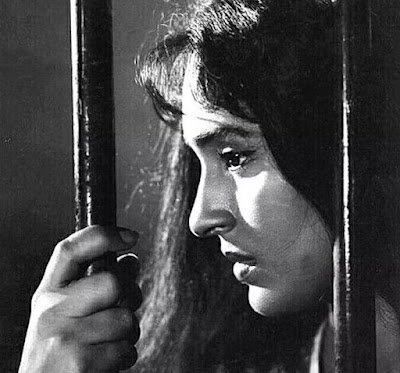

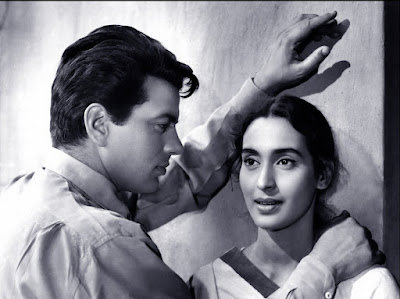
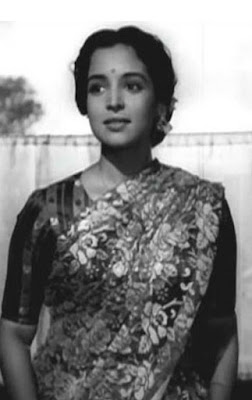
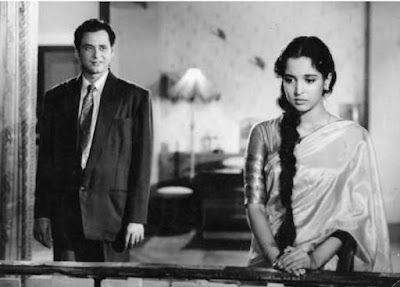



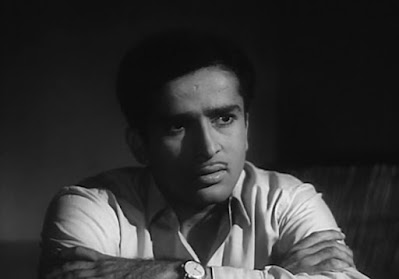

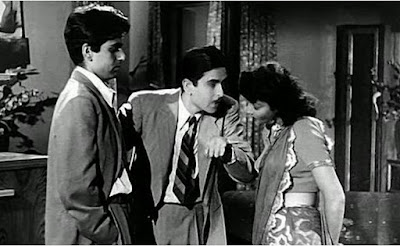





No comments:
Post a Comment